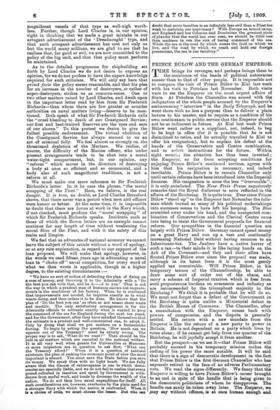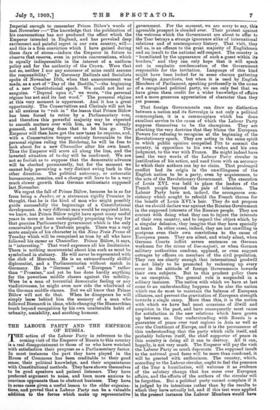PRINCE BULOW AND THE GERMAN EMPEROR. T IME brings its revenges,
and perhaps brings them to the assistance of the heads of political autocracies sooner than to that of other people. It is impossible not to compare the visit of Prince Billow to Kiel last week with his visit to Potsdam last November. Both visits were to see the Emperor on the most urgent affairs of State. At Potsdam the Chancellor was armed with the indignation of the whole people aroused by the Emperor's embarrassing " interview " in the Daily Telegraph, and he went there with no less a purpose than to deliver a plain lecture to his master, and to require as a condition of his own continuance in public service that the Emperor should not be so indiscreet in future. At Kiel last week Prince Billow went rather as a suppliant, not, indeed, to beg to be kept in office (for it is possible that he is not disinclined to retire, and he actually travelled to Kiel to offer his resignation), but to explain his defeat at the hands of the Conservative and Centre combination, and to solicit instructions for the future. Within eight montL3 the situation has thus been inverted ; the Emperor, so far from accepting conditions for enjoying Prince Billow's continued services, agrees with him that his resignation is necessary, and indeed inevitable. Prince Billow is to remain Chancellor only until certain reforms have been introduced into the Imperial finances. His resignation is none the less "irrevocable"; it is only antedated. The Neue Freie Presse sagaciously- remarks that the Royal disfavour is soon reflected in the affairs of the Reichstag. It is quite true. Ever since Prince Billow "stood up" to the Emperor last November the talis- man which turned so many of his political undertakings into successes seems to have left his keeping. The Bloc crumbled away under his hand, and the unexpected com- bination of Conservatives and the Clerical Centre came into being to resist the Government proposals for financial reform. Our sympathies in the financial question are largely with Prince Billow. Germany cannot spend money on a great Navy and run up a vast and continually increasing National Debt without having recourse to an Inheritance-tax. The Junkers have a native horror of such a tax—to their minds it is like laying hands on the Ark of the Covenant—and they and their allies have flouted Prince Billow ever since the proposal was made, although in its latest form it is the most gently applied tax conceivable. Will Prince Billow, in his temporary tenure of the Chancellorship, be able to draw some sort of order out of the chaos, and carry a scheme of Imperial taxation which is free from such preposterous burdens on commerce and industry as are recommended by the triumphant majority in the Reichstag ? We think it is probable that he will do so. We must not forget that a defeat of the Government in the Reichstag is quite unlike a Ministerial defeat in the British House of Commons. The Chancellor, after a consultation with the Emperor, comes back with powers of compromise, and the dispute is generally settled. His return with a new mandate from the Emperor is like the return of a new party to power in Britain. He is not dependent on a party which lives by votes alone ; if he cannot get help from one quarter of the Reichstag, he will joyfully accept it from another.
But the prospect—as we see it—that Prince Billow will probably succeed in his temporary mission makes the ending of his power the more notable. It will be said that there is a sign of democratic development in the fact that Prince Billow is the first German Chancellor who has expressly retired in the face of an adverse Parliamentary vote. We read the signs differently. We fancy that the Emperor is willing to have Prince Billow's career brought to an cud in spite of the handle that is being given to the democratic politicians of whom he disapproves. The handle can easily be taken away later. The Emperor, we play say without offence, is at once human enough and Imperial enough to remember Prince Billow's words of last November :--" The knowledge that the publication of his conversations has not produced the effect which the Emperor intended in England, and has provoked deep excitement and painful regret in our own country, will— and this is a firm conviction which I have gained during these days of stress—induce the Emperor in future to observe that reserve, even in private conversations, which is equally indispensable in the interest of a, uniform policy and for the authority of the Crown. Were that not so, neither I nor any successor of mine could assume the responsibility." In Germany Radicals and Socialists spoke of November 10th, when that announcement was made, as a sort of "Day of the Bastille,"—the beginning of a new Constitutional epoch. We could not feel so sanguine. "Depend upon it, ' we wrote, "the personal regime has not said its last word." The personal regime at this very moment is uppermost. And it has a great opportunity. The Conservatives and Clericals will not be at all anxious to "rub in " the lesson that Prince Billow has been forced to retire by a Parliamentary vote, and therefore this powerful majority may be expected to smooth matters over with him, as we have already guessed, and having done that to let him go. The Emperor will then have got the new taxes he requires, and, with a Conservative temper entirely favourable to the personal regime ruling the Reichstag, he will be free to look about for a new Chancellor after his own heart. Thus the Emperor will score all along the line, and the inverted situation of to-day will be confirmed. We are not so foolish as to suppose that the democratic advance will be checked permanently, but for the moment we cannot help perceiving a very distinct swing back in the other direction. The .political autocracy, or autocratic bureaucracy, remains, and a change will have to be a very much slower growth than German enthusiasts supposed last November.
We regret the fall of Prince Billow, because he is so far from being a Junker, or a statesman rigidly Prussian in thought, that he is the kind of man who might possibly guide successfully the beginnings of a Constitutional development. A very different man would be required later, we know, but Prince Billow might have spent many useful years in more or less undesignedly preparing the way for that genuine Parliamentary government which is the only conceivable goal for a Teutonic people. There was a very acute analysis of his character in the Nene Preis Presse of Tuesday which will be recognised as true by all who have followed his career as Chancellor. Prince Billow, it says, is "interesting." That word expresses all his limitations. There is nothing monumental about him such as must be symbolised in statuary. He will never be represented with the club of Hercules. He is an extraordinarily skilful diplomatist, and a Parliamentarian without match in Germany. He is " German " and " European " rather than "Prussian," and yet he has done hardly anything for the powerless middle classes against the nobility. Were he a man of torrential democratic feeling or any 'vindictiveness, he might even now ride the whirlwind of the German middle classes. , But we all know that Prince Billow will not do that. When he disappears he will simply leave behind him the memory of a man who followed Bismarck in ideas, while changing the Bismarckian touch beyond recognition by his own unalterable habit of urbanity, amiability, and soothing humour.















































 Previous page
Previous page